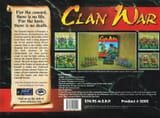>>96467696
>Maybe this is nothing new, but I don't remember ever seeing this ten years ago.
It's a very old thing that came back in fashion because it got cheap. Early on, you needed more money to print cards. But think Warhammer 40k 2e, Clan War, Deadlands, etc. There's always been a trickle of games with cards, Kickstarter and Chinese slave labor made it a flood.
>Pros
Cards always use a dependent probability (what comes next is influenced by what came last) and the designer can skew them as they see fit
Likewise, wargear cards automatically place a limit (in theory) on duplicate items. Can be a balance thing
Hidden information and resource storing. Kensei did this particularly well. Cards can also be used as objective markers, pre-assigned treasure stashes, and the like
They add feelies and another place for art or story elements in a game, and can increase a box's perceived value. Even if the game only uses a regular deck of playing cards, custom decks are a common impulse purchase (see: Blood and Plunder, Deadlands, et. al.)
Quick reference to rules without opening the book
>Cons
For scummy creators, they're a great gacha/chase element. It's one of the ways Xwing and Armada pumped sales numbers; put critical cards for one ship into another box, especially cards you "need" multiples of. And of course that ship works best with some stuff from box #3..
Cards physically degrade very quickly, especially if you need to shuffle them multiple times per game. They're relatively easy to lose and often difficult to replace
It's extremely hard to effectively errata a card without a new print run, and using errata with them interrupts gameplay constantly. You might as well just have a table at that point. This bit Xwing in the ass.
Cards inevitably slow down setup and teardown: they usually also drag down gameplay, especially if there are a lot of rules on each card. They add a lot of "churn", so people can feel like they're doing more even with a shallow set of rules
